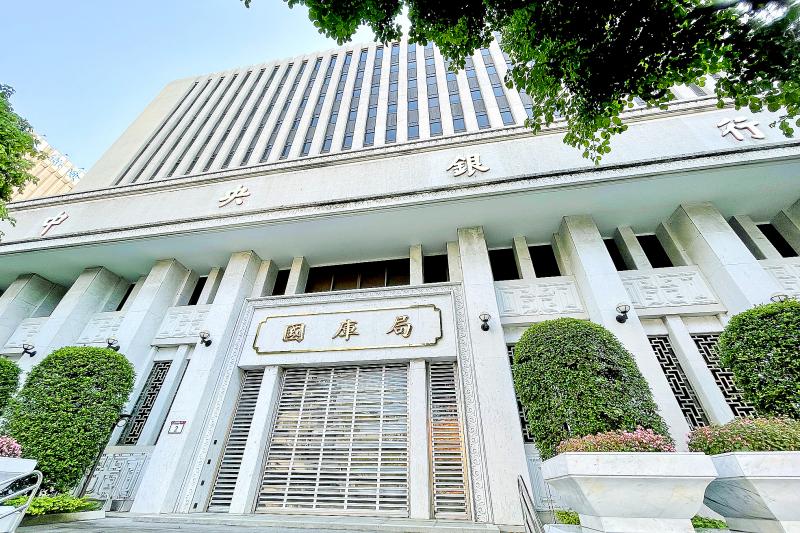The central bank from June 1 is to reduce the overall value of the 364-day and two-year certificates of deposit it auctions monthly, as market expectations of higher interest rates have affected its open market operations, it said yesterday.
In response to the banking system’s capital situation and local banks’ asset allocation needs, the monthly auction amount of 364-day certificates of deposit would drop to NT$140 billion (US$4.8 billion) from NT$170 billion, while that of two-year certificates of deposit would decrease to NT$25 billion from NT$60 billion, the central bank said in a statement on its Web site.
The central bank normally sells certificates of deposit of various maturities as part of its open market operations to drain excess liquidity from the banking system. Domestic financial institutions such as banks, credit co-operatives, bills finance companies and state-run Chunghwa Post Co (中華郵政) are major participants in certificate of deposit auctions, it said.

Photo: George Tsorng, Taipei Times
The central bank had last month planned to auction NT$60 billion worth of two-year certificates, but only attracted bids worth a total of NT$5.9 billion, the Central News Agency reported yesterday.
That indicated that local financial institutions have low demand for the central bank’s certificates of deposit at this stage, prompting the bank to adjust its open market operations, market watchers said.
Worldwide, rising inflationary pressures due to a surge in energy prices and a slowing economic growth affected by government measures to curb the spread of COVID-19 have forced global central bankers to cautiously adapt their open market operations and monetary policies, they said.

Taiwan’s long-term economic competitiveness will hinge not only on national champions like Taiwan Semiconductor Manufacturing Co. (TSMC, 台積電) but also on the widespread adoption of artificial intelligence (AI) and other emerging technologies, a US-based scholar has said. At a lecture in Taipei on Tuesday, Jeffrey Ding, assistant professor of political science at the George Washington University and author of "Technology and the Rise of Great Powers," argued that historical experience shows that general-purpose technologies (GPTs) — such as electricity, computers and now AI — shape long-term economic advantages through their diffusion across the broader economy. "What really matters is not who pioneers

In a high-security Shenzhen laboratory, Chinese scientists have built what Washington has spent years trying to prevent: a prototype of a machine capable of producing the cutting-edge semiconductor chips that power artificial intelligence (AI), smartphones and weapons central to Western military dominance, Reuters has learned. Completed early this year and undergoing testing, the prototype fills nearly an entire factory floor. It was built by a team of former engineers from Dutch semiconductor giant ASML who reverse-engineered the company’s extreme ultraviolet lithography (EUV) machines, according to two people with knowledge of the project. EUV machines sit at the heart of a technological Cold

Taiwan Semiconductor Manufacturing Co (TSMC, 台積電) last week recorded an increase in the number of shareholders to the highest in almost eight months, despite its share price falling 3.38 percent from the previous week, Taiwan Stock Exchange data released on Saturday showed. As of Friday, TSMC had 1.88 million shareholders, the most since the week of April 25 and an increase of 31,870 from the previous week, the data showed. The number of shareholders jumped despite a drop of NT$50 (US$1.59), or 3.38 percent, in TSMC’s share price from a week earlier to NT$1,430, as investors took profits from their earlier gains

TAIWAN VALUE CHAIN: Foxtron is to fully own Luxgen following the transaction and it plans to launch a new electric model, the Foxtron Bria, in Taiwan next year Yulon Motor Co (裕隆汽車) yesterday said that its board of directors approved the disposal of its electric vehicle (EV) unit, Luxgen Motor Co (納智捷汽車), to Foxtron Vehicle Technologies Co (鴻華先進) for NT$787.6 million (US$24.98 million). Foxtron, a half-half joint venture between Yulon affiliate Hua-Chuang Automobile Information Technical Center Co (華創車電) and Hon Hai Precision Industry Co (鴻海精密), expects to wrap up the deal in the first quarter of next year. Foxtron would fully own Luxgen following the transaction, including five car distributing companies, outlets and all employees. The deal is subject to the approval of the Fair Trade Commission, Foxtron said. “Foxtron will be